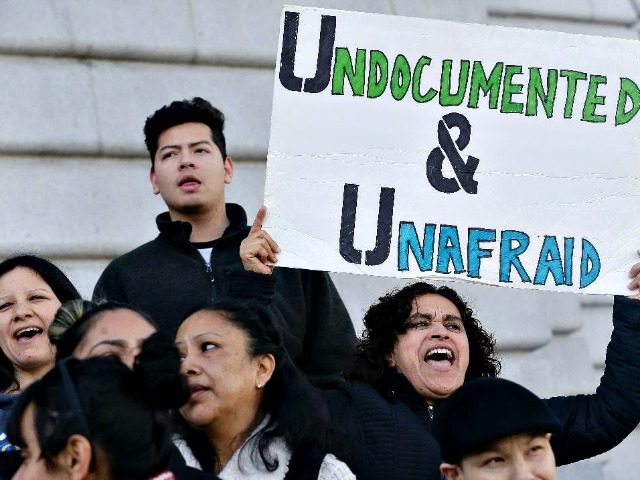A federal court in California dealt President Donald Trump another legal setback on Tuesday in his efforts to combat illegal aliens, blocking an executive order (EO) that denies federal funds to sanctuary cities. This issue appears eventually destined for a Supreme Court showdown.
The president issued Executive Order 13,768 on January 25, 2017. The order instructs the Departments of Justice and Homeland Security to deny federal grant money for local law enforcement activities to cities and counties that refuse to cooperate with the federal government in dealing with illegal aliens. This cooperation typically consists of reporting certain types of illegal alien criminal activity to Washington, or agreeing to detain illegal aliens who are in jail long enough for federal agents to pick them up and deport them out of this country.
Various cities and counties are suing the Trump administration in federal court, arguing that EO 13,768 is unconstitutional. Two of those cases are currently before Judge William Orrick H. Orrick III of the U.S. District Court for the Northern District of California, one brought by San Francisco County and the other by Santa Clara County.
Even though the federal government has not yet defined “sanctuary jurisdictions” or specified exactly what federal funds they would forfeit—and therefore that the EO is not yet in effect—Judge Orrick issued a preliminary injunction in those two cases on Tuesday, in what is called a “pre-enforcement challenge.”
“The defunding provision is entirely inconsistent with the law in its stated purpose and directives because it instructs the Attorney General and Secretary to do something that only Congress has the authority to do—place new conditions on federal funds,” Orrick ruled in his 49-page order.
The district court cited certain cases that make it sound like the Constitution’s standard for a pre-enforcement challenge is easy to satisfy, such as cases holding that the challenger need only show “a credible threat of enforcement.”
Orrick did not discuss other controlling cases, in which the Supreme Court made clear that this constitutional standard is a demanding one, under which the plaintiff must show that it is almost certain that the government is going to injure a person before that person can be a plaintiff who can preemptively sue to stop the government’s plans.
The judge concluded that “the Counties are likely to be designated ‘sanctuary jurisdictions’ under their reasonable interpretation of the Executive Order,” concluding this was sufficient to confer standing for the counties to sue.
After having claimed jurisdiction to decide these cases, Orrick ruled the relevant part of the EO unconstitutional on several grounds, and ordered Attorney General Jeff Sessions and Homeland Security Secretary John Kelly not to carry out Section 9(b) of EO 13,768.
“The Counties’ claims implicate a constitutional interest, the rights of states and local governments to determine their own local policies and enforcement priorities pursuant to the Tenth Amendment,” the judge continued. “The Counties explain that their sanctuary policies reflect local determinations about the best way to promote public health and safety.”
Orrick quoted the Supreme Court’s seminal 1987 case South Dakota v. Dole, in which the Court held, “Incident to [its spending] power, Congress may attach conditions on the receipt of federal funds, and has repeatedly employed the power to further broad policy objectives by conditioning receipt of federal moneys upon compliance by the receipt with federal statutory and administrative directives.”
The judge held that Dole mandates that only Congress can place conditions on removing federal funding, not the president. “Where Congress has failed to give the President discretion in allocating funds, the President has no constitutional authority to withhold such funds and violates his obligation to faithfully execute the laws duly enacted by Congress if he does so,” he ruled.
The judge also took a very strict view of what sort of conditions even Congress can place on federal grants, which is ironic because liberal judges often say the federal government has vast powers when it comes to spending policy. But this separation-of-powers argument that only Congress can strip funding, not the president, may be the issue in the lawsuit where the plaintiffs have the best chance of winning.
Another plausible issue is where he invokes the Tenth Amendment’s coercion doctrine, which holds that Congress can never use its power to spend money under the Constitution’s Spending Clause in a way that actually coerces the states to obey the federal government. Only once has the Court held that this constitutional line was crossed, when it struck down part of Obamacare’s Medicaid expansion in the 2012 case NFIB v. Sebelius.
In contrast to those debatable issues, Orrick also latches onto two other issues that are far outside the mainstream.
One is that he says the EO violates the Fifth Amendment Due Process Clause because it is unconstitutionally vague, which should not hold up on appeal for a number of technical reasons.
The other is that the EO violates state sovereignty under the Tenth Amendment because it conscripts local law enforcement to administer federal law, which is forbidden by the Constitution’s anti-commandeering rule. That part of the decision is patently absurd because the EO is about how to provide financial incentives for local officials to freely choose to conduct local policy in a way that is conducive to federal agents carrying out federal immigration law, not requiring those local police to carry out federal immigration law.
These cases will now go to the U.S. Court of Appeals for the Ninth Circuit. From there, either these cases, or one of a couple of parallel legal challenges wending their way through the federal legal system, will very likely end up before the U.S. Supreme Court, possibly in 2018.
The consolidated cases are City of County of San Francisco v. Trump, No. 17-cv-485, and County of Santa Clara v. Trump, No. 17-cv-574.
EO 13768-San Fran v. Trump-NDCA PI
Ken Klukowski is senior legal editor for Breitbart News. Follow him on Twitter @kenklukowski.

COMMENTS
Please let us know if you're having issues with commenting.